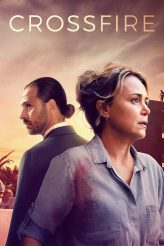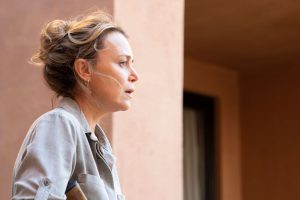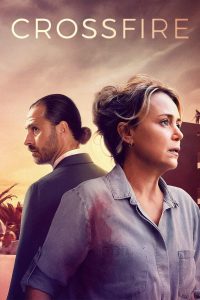In creator Louise Doughty’s CROSSFIRE miniseries, originally on BBC1 in the U.K. and now streaming in its three-part entirety on Britbox in North America, we know at the start that something terrible has happened, but at first, not what it is, or who has been lost.
Keeley Hawes stars as Jo, a resident of Leicester, England. Jo currently advises on security issues at a department store. She is married to Jason (Lee Inglesby); they have two little boys together, plus Jo’s daughter Amara (Shalisha James-Davis) from a previous marriage.
Jo invites her best friends Miriam (Josette Simon) and Abhi (Anneika Rose) and their respective families to join her, Jason and their kids on a vacation at a beachside resort in the Canary Islands. Once there, while Jo and Jason are angry with each other and everyone is separated for morning activities, gunfire breaks out from multiple locations within the resort.
CROSSFIRE moves back and forth from the shooting and the immediate consequences – people trying to escape or save each other – to what happened earlier at home, and the aftermath for the survivors.
Doughty, who is one of CROSSFIRE’s executive producers, along with lead Hawes, gets on an exclusive Zoom call to talk about how the limited series was created, made, and received in the U.K.
ASSIGNMENT X: Is CROSSFIRE based on an actual incident? If not, what was your inspiration for it?
LOUISE DOUGHTY: It’s definitely not based on an actual incident, but a lot of it actually comes from something that happened to me many years ago. When I was a young commuter in London, I had a close shave with a terrorist attack. I was on London Bridge Station when it was bombed in February 1992.
And it was a very strange time in London’s history. We had the Marchioness Disaster, which was, a pleasure boat went down in the Thames. We had the King’s Cross fire, in which thirty-one people died. This was in the middle of an IRA bombing campaign as well, and there was a whole feeling for a while that even just commuting to your job in London was quite a risky thing to do.
And I think what never really left me was that idea that chance and contingency play such a big role in our lives. We never really know what’s around the corner. You go out to the shops and something happens, or you book that particular hotel, that particular day to arrive, that feeling that something unexpected could come along at any time, and if it did, how would I behave?
AX: Once you had the premise for CROSSFIRE, how did you decide who your characters should be, and how many stories you should be telling within it?
DOUGHTY: Well, I was new to television when I wrote this [laughs]. It’s my first-ever television drama. And I suppose my first duty was to work out, how could I keep the tension up? Your first duty as a dramatist is to keep people fascinated by what’s happening on the screen. And I knew right from the start that, when the attack began on the hotel, what I wanted was for the three families, who are my main characters, all to be separated from other family members, so that what is at the beginning quite a luxurious resort becomes like a kind of escape room, upstairs and downstairs, in the basement area and all the others, where the people are trapped.
And it’s not just that they can’t escape. Some people can escape from the hotel, but obviously, if your family members are still inside, what do you do? Do you save yourself, in the hope that they’re outside? Do you go hunting for them? Do you help the strangers around you? I do believe very strongly that we all want to think that, under those circumstances, we would be heroic. But of course, none of us really know how we would behave. I hoped that, with the characters we’ve got, what I show is a range of behavior. Some people behave heroically but stupidly; some people behave not so heroically to start off with, and then heroically later. Human beings are complex, and nobody really knows quite how they would deal with something like that.
AX: Keeley Hawes is one of your fellow executive producers. How was it having the lead as a colleague in that position?
DOUGHTY: It was a terrific help. Keeley came on at a relatively early stage. We had a draft of Episode 1, but I hadn’t even started Episodes 2 or 3. You get a big star like Keeley at the very beginning, and for a start, it means the thing gets greenlit, which is obviously a huge plus, because without that, nothing else can happen. But it also meant that she read the early drafts of Episodes 2 and 3. She made some fantastic comments, she made very pertinent comments about the character that she was playing, Jo, but also the other characters. She was in on all the casting Zooms, when we were casting the other parts, and for me, as a new writer, to have the lead on board that early was a terrific help. In fact, we did have a standing joke that we almost always agreed with each other. When it came to debates on the Zoom, whether it was script or casting, we tended to think along very, very similar lines, so that was a big plus for me.
AX: Once you knew that Keeley Hawes would be playing Jo, did you start writing the character in a way that you hadn’t been writing her previously?
DOUGHTY: Not that I’m aware of, because what was very clear, right from the beginning, was that Jo was the lead, and that it was her show, but also that she was always going to be, as Keeley called her, a messy individual. Jo is a complicated character. She’s not a bad person, but she still behaves in some ways that are quite reprehensible. She’s a person who has a problem with accountability for her own actions. She’s not good at saying to herself, “Okay, I want this thing, but really, I should be a bit more responsible here, and not have it.”
And what was terrific was that Keeley was very much up for that. She wasn’t an actor who wanted to play somebody who was good all the time, or heroic all the time. She was really on board with the idea that Jo is just messy and complex, and doesn’t get things right. And it’s really, if you like, her moral and personal trajectory, which is also a very strong part of the drama of the show.
AX: How did you decide Jo should be a former police officer? Was that to establish how she knows what to do at certain times?
DOUGHTY: Yes, and it was important she’s an ex-police officer, because what I didn’t want was for her to be too competent [laughs]. I didn’t want her to be somebody who would know exactly what to do, who would pick up the gun and be able to fire it straight away. I wanted her to be somebody who had her own insecurities, who had left the police. It is fifteen years previously she’s left the police. Her firearms training is very rusty. And she’s somebody who actually, at several stages, during the drama, just believes she can’t do it. She’s somebody who makes mistakes. Her first attempt at confronting one of the killers nearly ends in disaster. She puts her own life, and the life of her daughter, at great risk, because it’s just a much more interesting journey for her throughout the series if, at the beginning, she has some training, but no real competency. And during the show, she has to try and achieve that.
AX: Jo is the lead, but there are a lot of characters whose stories we follow in CROSSFIRE. How did you decide who you were focusing on when, and when you would get back to them, and how much time we’d spend with them? Did you have to use something physical to keep track, like a whiteboard or file cards, or something like that?
DOUGHTY: Oh, no. That makes me sound a lot more organized than I am. If only [laughs]. I think I’ve learned my lesson. My writing method was a lot more chaotic than that. A lot of the time, it came down to me suddenly realizing that it was a while since we had checked in with a character, and that I really needed to get back to them. And then of course, it’s a bit like doing a Rubik’s cube, because there are multiple characters in multiple situations throughout the show. You go and check in with one character, and it means you’ve left another one. And of course, you can’t put them in suspended animation while you check in with what the other characters are doing. You’ve always got to bear in mind what is actually happening to the other characters while we are with this individual. And then, when we go back to the other characters, they have to have moved on. That was the hardest thing, really.
There certainly came a point in the drafting of it where I had to sit down and do a timeline, and just say, “Okay, we’ve been with So-and-So for three minutes. During that three minutes, what has everybody else been doing? Where are they physically?” And I realized that I had not made my life particularly easy by, if you like, creating a story where an attack happened to multiple characters in real time. It was a complex puzzle that I had set myself. I’m not sure I would have been that bold if I’d been more experienced. I might have been a bit more cautious, and made my life a bit easier.
AX: The casting of CROSSFIRE is multi-ethnic. Jo’s daughter is biracial, her ex-husband and one best friend are Black, her other best friend is Anglo-Indian. Was that aspect something you had written into the script?
DOUGHTY: That was embedded in the script for me. The characters live in Leicester, which is a very multi-ethnic city in the U.K., with a huge [Southeast] Asian population. So, I always knew that we were going to have an Asian family at the heart of the drama. It’s just reflecting modern Britain, certainly urban Britain.
I have to say I was pretty shocked that some of the reviews and responses online to the multi-ethnic casting – I shouldn’t have been shocked, really [laughs] – but the idea in this day and age, people can object to that. I mean, I had my head in my hands a couple of times in disbelief. I was accused of “woke” casting. Oh, and apparently, I wrote “feminist shite,” according to someone on Twitter, because I had female characters in the leads. [laughs] The joys of social media when you write a television drama. But I am a feminist, and I live in a multi-ethnic society. I have a slightly complicated ethnic history myself, I’m very proud of it. We live in the modern world. Come on, guys [laughs]. The idea that this is controversial in this day and age still completely baffles me.
AX: That’s dismaying, but sadly not entirely surprising. How did you come to set CROSSFIRE in the Canary Islands, which is where you filmed the resort sequences?
DOUGHTY: The Canary Islands has been my favorite holiday destination for many, many years. I’ve been there with my family lots of times, way before I got the idea for CROSSFIRE. The great thing about the Canary Islands, if you live in the U.K. or Europe is, it’s one of the few places you can get to where you can get some sunshine without getting on a long-haul flight. Being British, I’m desperate for sunshine most of the year round [laughs].
The Canary Islands, although legally they’re part of Spain, they’re actually much closer to the North African coast than they are to the Spanish mainland. That’s why they get such fantastic sunshine. And the Canary Islands are full of these kinds of big resort hotels that you see in CROSSFIRE, horseshoe-shaped, facing the sea, one entrance or exit towards the sea, and then these big labyrinthine places ranged along the coast. So, the architecture of them seems to me really useful for this particular storyline, where I wanted my characters trapped in somewhere that initially seemed quite luxurious, but then became threatening and strange.
A lot of the Canary Islands are quite big. On an island like Tenerife, Special Forces would get to you a bit more quickly than they do in CROSSFIRE. So, we invented a small island, and we put [the resort] on a remote part of that small island, in order for it to be plausible that it is nearly an hour before Special Forces can arrive. We wanted our characters to be thrown back on their own devices a lot.
AX: As far as the antagonists, how did you decide on what their motives were?
DOUGHTY: There was a bit of deliberate misdirection in that most British viewers, I think, would have assumed that it was a religiously-motivated terrorist attack. That is, in general, our experience of domestic or resort terrorism. And in actual fact, of course, the vast majority of gun attacks are not performed by people with strong ideologies, they’re performed by disaffected young men. In Europe, we tend to think of this as sort of an American phenomenon. But I don’t think that any society can afford to be lax on that issue. I think it can happen anywhere.
I suppose what I was aiming for, with the young killers, is a kind of European equivalent of a high school shooter. They’re disaffected young men. They have no particular ideology; they’re nihilists. And it was important that in some ways that their motivation is arbitrary. There is no real plan behind the attack. There’s nothing they’re hoping to achieve. They’re just lost young men. So far, we have not had so many of those attacks in Europe, but I don’t think we can afford to be smug about that. I think it can happen anywhere. I was very aware that in America that it would resonate differently, because of the different history of gun attacks in America. But these things do happen all over the world for different motivations.
[In CROSSFIRE], the focus is very much on the victims, the people on the receiving end and, crucially, the idea that they have to go back home after the attack, and live their ordinary lives. And to me, that’s the most important part of the drama, is what it is actually like for survivors after this horrendous thing has happened, but the next week, you might be queueing in the supermarket for milk, or passing the neighbors in the street. These horrific things happen within the context of whole lives, and how you begin to assimilate an event like this into a so-called ordinary life was very hard to imagine.
AX: And what would you most like people to get out of CROSSFIRE?
DOUGHTY: I think what I would most like people to get out of it is, nobody knows how they would react in extreme circumstances. We all want to believe that we would be heroic, that we would save our loved ones, that we would save strangers. But in actual fact, none of us can say that for sure. And quite often, the people who are most convinced of their own heroism would be the people who would run a mile [away], and vice-versa. None of us can say for certain.
What this knowledge should encourage us to do is to be less judgmental. When we read a news story, when we hear about terrible things happening, when we know that a neighbor or a relative or a friend has had this appalling event, our job is to recognize that terrible and appalling things happen to people, and the only appropriate response is for us to express sympathy, to let people talk if they need to. But I think we do all have a tendency to be judgmental. We tend to think, “Oh, I would never behave like that, I would never do that.” And the truth is, we just have no idea until we’re actually in those circumstances ourselves.
Follow us on Twitter at ASSIGNMENT X
Like us on Facebook at ASSIGNMENT X
Article Source: Assignment X
Article: Exclusive Interview: CROSSFIRE creator Louise Doughty on the new Britbox mini-series
Related Posts:













